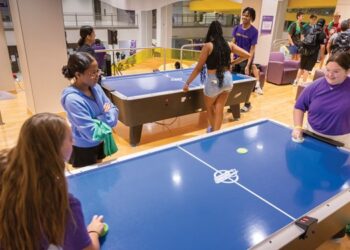There is nothing more frustrating for a player than a ref who clearly doesn’t know what he or she is doing. Your students will quickly become disengaged from intramural sports if they sense your officials aren’t properly trained.
In order to keep students engaged in intramural sports and minimize the risk of fights breaking out, your department should invest time and resources into training intramural officials.
“I have found the best way to train our officials is through interactive modules,” said Melanie Alexander, the assistant director of recreation at Colorado College. “Anything we can do to get our officials up and moving has not only helped increase a sense of confidence, but also employee retention.”
There’s only so much an official can learn from an instructional video, and when the time comes to blow the whistle in a live game, you want confidently making the correct call to be second nature. This is accomplished by training intramural officials in live simulations.
“While it would be ideal to have ‘friendly matches’ in each sport for new officials to officiate without any consequences, sometimes our timeline and resources do not allow for it,” said Alexander. “We have to get creative and look for any training opportunity to mimic play.”
According to Alexander, there are plenty of ways to mimic a live game. “This can be as simple as walking a field and talking about proper spacing, then watching game film and challenging your officials to blow their whistles when they see a foul — which is rather loud, but provides quite a few laughs.”
Finding students with a lot of officiating experience could be difficult, depending on the size of your school, so your options might be limited. The preferred scenario is to fill your staff with professional referees, but on a college campus, you’ll have to make do with the students in your program.
“I have seen the benefits of formal training and certifications, especially with highly competitive and heavily participated programs,” said Alexander. “However, at Colorado College we focus on the basics, due to the nature of our program.”
And Alexander doesn’t look only at past work experience when hiring officials. “If students have a general knowledge of the game, a good attitude and a willingness to work for us, they’re hired,” she said.
This isn’t to say you should hire students who aren’t qualified. Rather, there are certain qualities that make students coachable. Being coachable is a very valuable characteristic when training your intramural officials.
“I do my best to foster those soft skills we see in successful officials,” said Alexander. “You can tweak mechanics throughout the season and reiterate the rules during debriefs, but instilling a sense of confidence and a presence on the field or court from the very beginning is crucial.”
Early development of positive personality traits has helped Colorado College’s officials learn how to integrate their natural skillset into officiating to create a great intramural experience for participants.
“For us, safety and enjoyment are paramount,” said Alexander. “While we love to have high numbers for participation, we want to focus on why our participants are coming out to play. So we ask our officials to foster an environment of fun.”
At the end of the day, an intramural sport is still just a game. “Yes, we establish rules are important and we need to control the game, but we want our officials to build rapport with the teams and do their best to make sure [students of] all skill levels are enjoying themselves,” said Alexander.
Training intramural officials will help maintain a safe environment during the games themselves, but it will also improve the culture of your rec program as a whole. Having experienced officials present during your intramural sports will help foster an environment of friendly competitiveness among your students.
So take the time to train your officials properly, and get them ready for live game action. Your students will be grateful. “Just as with any other program, our officials have a large role in the success of intramurals,” said Alexander.










